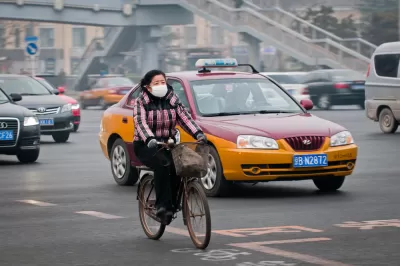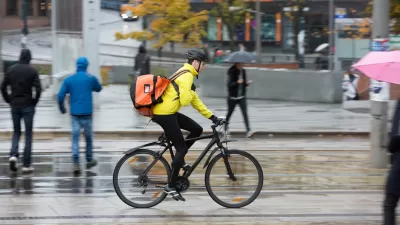Beijing has strayed so far from its roots as a bicycling city that it now claims the title of the world's largest auto market, while only 12 per cent of commuters use bicycles. City planners wants to make it popular again to reduce air pollution.

"Bikes became an integral part of China’s culture after the Communist revolution in 1949," writes Owen Guo, news researcher for The New York Times in Beijing. "Along with a sewing machine and a watch, a bicycle was once considered one of the three must-haves of every Chinese household."
As China has urbanized, families have become more prosperous and many city residents have moved to suburbs many miles from their jobs. The resulting growth in car use combined with lax law enforcement has undermined a half-century tradition of commuting on bikes.
How far and fast China's capital city has strayed from those roots. Consider that in 2000, 38 percent of commuters cycled to work. Guo writes a comprehensive piece that looks at the challenges that planners face to increase cycling.
Beijing "wants to increase the proportion of commuters who use bikes to 18 percent by 2020, according to city transportation officials," writes Guo. But the challenges are formidable.
A study (published in August) by researchers at Peking University in Beijing found that air pollution, safety concerns and a lack of road space were the main reasons people avoided biking to work in the capital.
"The negative perception that bicycle lanes have gradually been taken over by motorized vehicles is one key reason that deters motorized commuters from bicycling," write researchers Ming Yang and John Zacharias, which is confirmed anecdotally by Guo.
One reason for motorists parking in bike lanes is that "(t)he city has designed parking capacities that can accommodate only half of its five million cars, said Li Wei, an engineer at the Beijing Municipal Institute of City Planning and Design.
Outside of the capital city's horrific air pollution, cycling conditions share similarities with the United States. "(T)he city’s transportation policies have long favored cars," stated Wei, which any American cyclist can identify with.
Hat tip: Jennifer Scholtes, Politico Morning Transportation
FULL STORY: A City Choking on Cars Hopes Commuters Will Return to Two Wheels

Alabama: Trump Terminates Settlements for Black Communities Harmed By Raw Sewage
Trump deemed the landmark civil rights agreement “illegal DEI and environmental justice policy.”

Planetizen Federal Action Tracker
A weekly monitor of how Trump’s orders and actions are impacting planners and planning in America.

The 120 Year Old Tiny Home Villages That Sheltered San Francisco’s Earthquake Refugees
More than a century ago, San Francisco mobilized to house thousands of residents displaced by the 1906 earthquake. Could their strategy offer a model for the present?

In Both Crashes and Crime, Public Transportation is Far Safer than Driving
Contrary to popular assumptions, public transportation has far lower crash and crime rates than automobile travel. For safer communities, improve and encourage transit travel.

Report: Zoning Reforms Should Complement Nashville’s Ambitious Transit Plan
Without reform, restrictive zoning codes will limit the impact of the city’s planned transit expansion and could exclude some of the residents who depend on transit the most.

Judge Orders Release of Frozen IRA, IIJA Funding
The decision is a victory for environmental groups who charged that freezing funds for critical infrastructure and disaster response programs caused “real and irreparable harm” to communities.
Urban Design for Planners 1: Software Tools
This six-course series explores essential urban design concepts using open source software and equips planners with the tools they need to participate fully in the urban design process.
Planning for Universal Design
Learn the tools for implementing Universal Design in planning regulations.
Clanton & Associates, Inc.
Jessamine County Fiscal Court
Institute for Housing and Urban Development Studies (IHS)
City of Grandview
Harvard GSD Executive Education
Toledo-Lucas County Plan Commissions
Salt Lake City
NYU Wagner Graduate School of Public Service




























